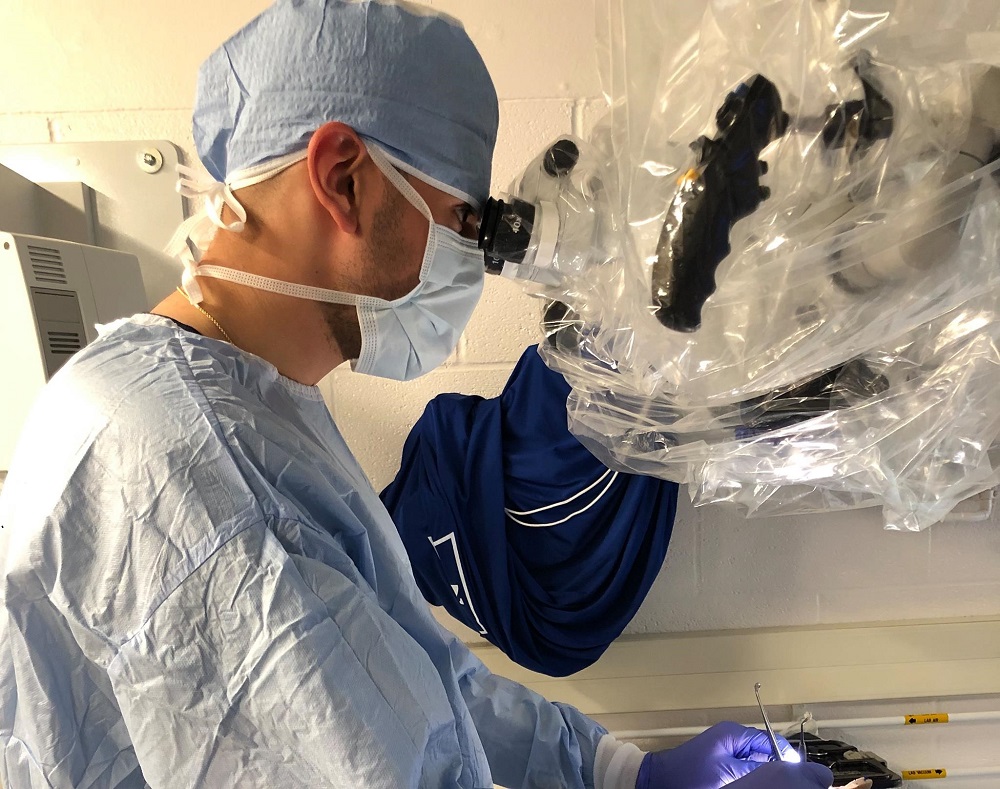Hershey Medical Center teaches future generations at International Neurosurgery Resident Course

Educate, stimulate and inspire the future leaders of neurosurgery. That was the aim of the Fourth International Neurosurgery Resident Course at Penn State Health Milton S. Hershey Medical Center March 30 to April 2.
If you ask Albert Alan, a first-year medical student from the University of Arizona College of Medicine-Tucson, course organizers exceeded their goal. “It was incredible. I had the opportunity to do things a first-year neurosurgery resident would do. It was a great privilege to be able to attend this course.”
Darya Nesterova, who is working on a doctoral degree in biomedical science at the Milton S. Hershey Medical Center, agrees. “It’s hard for medical students to get a lot of exposure to fields like neurosurgery. This was an amazing experience, and I would encourage more medical students to attend.”
The course featured lectures and hands-on workshops with cadavers. It was the first time the course has taken place in the United States. Previous locations were Berlin, Germany; Malaga, Spain; and Amsterdam, Netherlands. Next year, the course will be in France.
The idea for the Neurosurgery Resident Course was born several years ago through collaboration between Dr. Robert Harbaugh, chairman of the Department of Neurosurgery at Hershey Medical Center, and Dr. Ganesalingam Narenthiran, chairman of the World Federation of Neurosurgical Societies’ Young Neurosurgeons Forum.
“Most neurosurgery conferences are very expensive to attend,” Harbaugh said. “We had faculty from eight countries who were willing to pay their own travel expenses, making the course more affordable, particularly for those living in developing countries.”
For the faculty members, the course is about giving back and teaching the younger generation.
“I want them to know that I was once in their position,” said Dr. Elias Rizk, a neurosurgeon at Hershey Medical Center. “They are not alone. I want to inspire them, and I want them to know that no matter what their background or what barriers they face, they can achieve their goals no matter what others might tell them.”
For Alan, Rizk’s advice hits home. Once homeless, Alan earned three bachelor’s degrees simultaneously in physiology, sociology and neuroscience and cognitive science from the University of Arizona before entering medical school. “I feel like I have a family now. I can go anywhere in the world and have people who will help and guide me along my path to becoming a neurosurgeon.”
The course also provides faculty with a chance to expand their skills. “You have the opportunity to talk to colleagues from around the world and learn how they manage things,” Harbaugh said. “A lot of neurosurgery is little nuances and tricks that experienced people have learned, and the exchange of ideas is very valuable.”
Harbaugh is proud that Hershey Medical Center was able to host the course, especially since it has supported it from the beginning. He is also proud of nurturing young minds and cherishes when he learns how much the course meant to those, like Alan, who attended.
“I want to be the best neurosurgeon I can be,” Alan said. “I am so motivated to make a better life. I want to be able to help as many people as I can and make this world a better place, not just in the states but internationally.”
If you're having trouble accessing this content, or would like it in another format, please email the Penn State College of Medicine web department.
